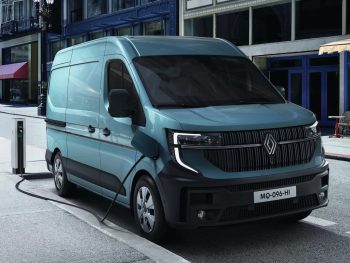Renault’s all-new Master E-Tech van has been rated for a 286-mile (460km) WLTP range, putting it at the forefront of the large van sector for EVs.

Due on sale this spring, the brand’s fourth-generation flagship van has been heavily overhauled and will be available with ICE versions and a future H2-tech hydrogen model as well as the E-Tech electric variant.
The E-Tech electric van has been designed to set a new standard for range and efficiency, thanks to the Master’s ‘Aerovan’ design concept and a new, fully optimised platform. These have helped to reduce power consumption by more than 27% compared with the current generation.
It will be available with two battery options – 40kWh and 87kWh – optimised in terms of capacity, size and mass and designed for overall efficiency at the top of the category.
The 40kWh battery is paired with a 131hp motor, giving around a 124-mile (200km) WLTP range (pending certification).
The 87kWh battery is teamed up with a 143hp motor, giving the headline 286-mile WLTP range and with a 21kWh/100km (62 miles) energy consumption, giving it a figure of 2.9mi/kWh.
It’s able to charge with a 130kW DC rapid charger, adding 157 miles (252km) of range in 30 minutes. A 22kW AC home wallbox tops up the battery from 10% to 100% in under four hours.
The Master E-Tech electric also provides 1,625kg of payload capacity (in a van requiring a B-category driving licence) and can tow 2.5 tonnes.
All powertrains will provide the highest efficiency in their categories, thanks to the new ‘Aerovan’ concept and the brand’s in-depth work on aerodynamics, which saw the Master E-Tech electric “engineered in a wind tunnel”.
The prototypes spent thousands of hours in the tunnel during development then, given the van’s size, certification tests were carried out in wind tunnel built for aircraft.
The result is an SCx drag coefficient that’s over 20% lower, ranking the van at the top end of the segment.
The E-Tech electric van also uses a battery heat management system to keep the temperature constant, increasing the battery’s performance and extends its useful life.
A standard-fit cab air conditioning system also helps to keep indoor temperature at optimal levels and the van’s range as long as possible, in summer as much as winter.
Other new features include a dynamic braking system – a first in an LCV – that limits the number of components in the motor compartment, while providing a faster response.
The van also includes vehicle-to-everything (V2X) capabilities. These include vehicle-to-load (V2L) functionality to charge other devices from an outlet in the cockpit or load area, while drivers can also use vehicle-to-grid (V2G) to feed energy from the battery to the grid using a bidirectional charger.
Connectivity features include Google Maps functionality that takes the user’s preferences into account and suggests optimised itineraries according to them, plus an Electric Route Planner.
The My Renault app provides an array of additional services tailored for electric vehicles.
Fleets will also be able to access a choice of services from Renault Group’s Mobilize mobility brand to enhance operation.
Sales for the Master E-Tech electric start this spring. All three versions (ICE, electric and hydrogen) and all the bodies come from the same production line in Batilly, eastern France.

